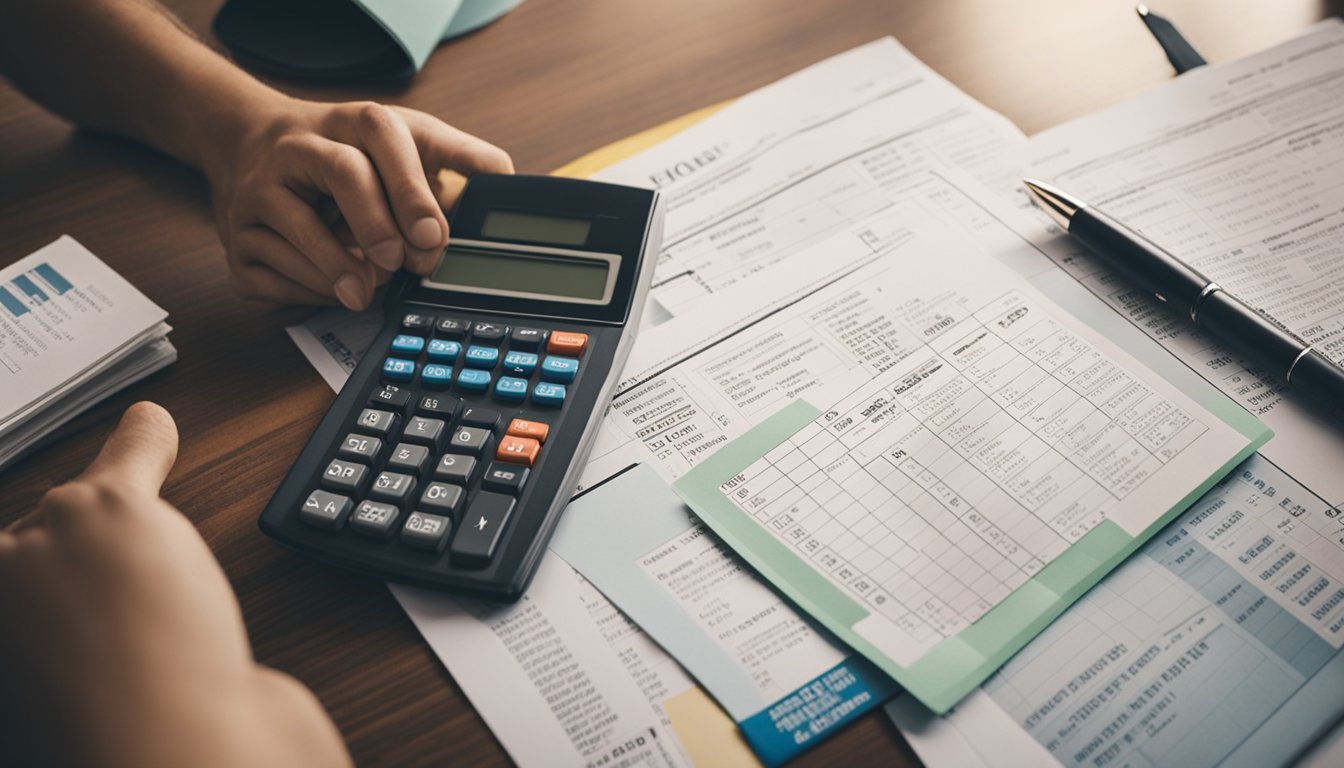If you’re feeling overwhelmed by debt, know that you’re not alone. Many people in Singapore struggle with debt, whether it’s from credit cards, personal loans, or other forms of borrowing. The good news is that there are steps you can take to clear your debt fast and get back on track financially.

One of the first things you’ll want to do is understand your debt situation. This means taking stock of all your debts, including the amount you owe, the interest rates you’re paying, and the minimum payments required each month. Once you have a clear picture of your debt, you can start creating a strategic debt clearance plan that takes into account your income, expenses, and other financial obligations.
Reducing expenses and increasing income can also help you clear your debt faster. This might mean cutting back on discretionary spending, taking on a side hustle, or negotiating a raise at work. Whatever steps you take, remember that clearing your debt will require dedication and perseverance. With the right mindset and a solid plan in place, you can achieve financial freedom and peace of mind.
Key Takeaways
- Understanding your debt situation is the first step to clearing your debt fast.
- Creating a strategic debt clearance plan that takes into account your income, expenses, and other financial obligations can help you achieve your goals.
- Reducing expenses and increasing income are key strategies for clearing your debt faster.
Understanding Your Debt Situation

If you’re looking to clear your debts fast in Singapore, the first step is to understand your debt situation. This will help you identify the best strategies to pay off your debts quickly and efficiently.
Assessing Your Total Debt
The first thing you need to do is to assess your total debt. This includes all your outstanding loans and unsecured debts. Make a list of all your debts, including the creditor, the outstanding balance, and the interest rate. This will give you a clear picture of how much you owe and to whom.
Reviewing Interest Rates and Terms
Once you have a list of your debts, review the interest rates and terms. Some debts may have high-interest rates, while others may have longer repayment terms. You need to prioritize paying off debts with the highest interest rates first, as they’ll cost you more in the long run.
Checking Your Credit Report
Your credit report is a record of your credit history and is used by lenders to determine your creditworthiness. It’s important to review your credit report regularly to ensure that it’s accurate and up-to-date. You can purchase a credit report from Credit Bureau Singapore to get an overview of your outstanding and current credit scoring [1].
By understanding your debt situation, you’ll be able to develop a plan to pay off your debts quickly and efficiently.
Creating a Strategic Debt Clearance Plan

Clearing your debt fast in Singapore requires a strategic plan that you can follow consistently. Here are the steps you can take to create a debt clearance plan that works for you.
Budgeting for Debt Repayment
The first step in your debt clearance plan is to create a budget that includes debt repayment. You need to know how much money you have coming in and going out each month. Once you have this information, you can create a plan to allocate a portion of your income towards debt repayment.
To make this process easier, you can use budgeting tools like spreadsheets or mobile apps. These tools can help you track your expenses and income, and make adjustments to your budget as needed.
Prioritising Debts: Snowball vs Avalanche Method
Once you have a budget in place, you need to prioritize your debts. Two popular methods for doing this are the snowball and avalanche methods.
The snowball method involves paying off your smallest debts first, while making minimum payments on your larger debts. Once you have paid off your smallest debt, you move on to the next smallest debt, and so on. This method can be motivating because you see progress quickly.
The avalanche method involves paying off your debts with the highest interest rates first, while making minimum payments on your other debts. This method can save you money in the long run because you are paying off the debts that are costing you the most in interest.
Considering Debt Consolidation Options
If you have multiple debts with high interest rates, you may want to consider debt consolidation. This involves taking out a new loan or credit card with a lower interest rate, and using it to pay off your existing debts.
Debt consolidation can simplify your debt repayment by combining multiple debts into one payment. This can also lower your overall interest rate, which can save you money in the long run.
Before choosing a debt consolidation plan, make sure you understand the terms and fees associated with the loan or credit card. Look for a plan that has a lower interest rate and manageable monthly payments.
By creating a strategic debt clearance plan that includes budgeting, prioritizing debts, and considering debt consolidation options, you can clear your debt fast in Singapore.
Reducing Expenses and Increasing Income

If you want to clear your debt fast in Singapore, you need to reduce your expenses and increase your income. This will allow you to free up extra funds that you can use to pay off your debt. Here are some ways to do it:
Cutting Down on Non-Essential Spending
The first step to reducing your expenses is to cut down on non-essential spending. This means looking at your budget and identifying areas where you can save money. For example, you could:
- Cut back on dining out and cook more meals at home
- Cancel subscriptions or memberships you don’t use
- Use public transport instead of driving
- Buy generic brands instead of name brands
- Shop for deals and discounts
By cutting down on non-essential spending, you can save money and put it towards paying off your debt.
Exploring Additional Sources of Income
Another way to clear your debt fast in Singapore is to explore additional sources of income. This means finding ways to make more money on top of your regular salary. Here are some ideas:
- Take on a part-time job or freelance work
- Sell items you no longer need or use
- Rent out a spare room on Airbnb
- Participate in paid surveys or focus groups
- Offer your skills and services on websites like Fiverr or Upwork
By exploring additional sources of income, you can increase your cash flow and put more money towards paying off your debt.
In conclusion, reducing expenses and increasing income are two key strategies for clearing your debt fast in Singapore. By cutting down on non-essential spending and exploring additional sources of income, you can free up extra funds and make significant progress towards becoming debt-free.
Negotiating with Creditors

If you are struggling with debt repayment, negotiating with your creditors can be a helpful step in clearing your debt fast in Singapore. Here are some options to explore:
Debt Management Programmes
Debt Management Programmes (DMPs) are a form of debt repayment plan that allows you to make a single monthly payment to a credit counselling agency, who will then distribute the funds to your creditors. This can help simplify your debt repayment process and make it more manageable. Additionally, DMPs may be able to negotiate lower interest rates and fees with your creditors, which can help you save money in the long run.
Credit Counselling Singapore is a non-profit organisation that offers DMPs to Singaporeans struggling with debt. They work with licensed moneylenders and creditors to help you develop a repayment plan that works for your unique financial situation.
Credit Counselling and Support
In addition to DMPs, Credit Counselling Singapore also offers free credit counselling and support services. These services can help you learn more about debt management and budgeting, and provide you with the tools and resources you need to get back on track financially.
When negotiating with creditors, it’s important to be honest and transparent about your financial situation. Explain your current financial difficulties and ask if they are willing to work with you to develop a repayment plan that is more manageable. Be prepared to provide documentation of your income and expenses to support your case.
Remember, creditors want to get paid, and many are willing to work with you to find a solution that benefits both parties. By negotiating with your creditors and exploring debt management options, you can take control of your finances and clear your debt fast in Singapore.
Exploring Legal Debt Relief Solutions

If you are struggling with debt in Singapore, there are several legal debt relief solutions available to you. These solutions can help you clear your debt fast and get back on track financially. In this section, we will explore two of the most popular legal debt relief solutions in Singapore: Debt Repayment Scheme (DRS) and Bankruptcy.
Debt Repayment Scheme (DRS)
A Debt Repayment Scheme (DRS) is a legal debt relief solution that allows you to consolidate your unsecured debts and repay them over a period of time. The DRS is administered by the Credit Counselling Singapore (CCS), a non-profit organisation that provides debt counselling and debt management services to individuals and families in Singapore.
To be eligible for a DRS, you must have unsecured debts of at least $10,000 and be able to make regular monthly payments towards your debt. The CCS will work with you to develop a debt repayment plan that is tailored to your financial situation. The plan will typically involve consolidating your debts into a single monthly payment, which will be distributed to your creditors.
Bankruptcy as a Last Resort
Bankruptcy is a legal process that can help you clear your debt fast, but it should be considered as a last resort. Bankruptcy is a serious decision that can have long-term consequences, such as affecting your credit score and ability to obtain credit in the future.
If you are considering bankruptcy, you should first explore other legal debt relief solutions, such as a Debt Repayment Scheme (DRS). If you have exhausted all other options and are still struggling with debt, bankruptcy may be the right choice for you.
In Singapore, bankruptcy is administered by the Insolvency and Public Trustee’s Office (IPTO), a government agency that handles bankruptcy cases and debt restructuring. To file for bankruptcy, you must owe at least $15,000 in unsecured debt and be unable to repay your debts.
In conclusion, if you are struggling with debt in Singapore, there are several legal debt relief solutions available to you. These solutions can help you clear your debt fast and get back on track financially. Explore your options and choose the solution that is right for you.
Maintaining Good Financial Habits

If you want to clear your debt fast in Singapore, you need to adopt good financial habits. Here are some tips to help you:
Using Credit Wisely
Using credit wisely is crucial to avoid getting into debt. Credit cards and other unsecured credit facilities can be useful, but they can also get you into trouble if you don’t use them responsibly. Here are some tips to help you use credit wisely:
- Pay your credit card bills on time and in full every month to avoid interest charges.
- Avoid using credit cards for cash advances or to buy things you can’t afford.
- Don’t apply for too many credit cards or other credit facilities at once, as this can hurt your credit score.
- If you have a loan or line of credit, make sure you understand the terms and conditions before signing up.
Building an Emergency Fund
Building an emergency fund is another important step to help you clear your debt fast. Having an emergency fund can help you avoid getting into debt in the first place, as well as provide a safety net if you do run into financial problems. Here are some tips to help you build an emergency fund:
- Set a savings goal and make a plan to achieve it.
- Start small and gradually increase your savings over time.
- Consider opening a separate savings account for your emergency fund.
- Avoid dipping into your emergency fund unless it’s absolutely necessary.
By using credit wisely and building an emergency fund, you can avoid getting into debt and clear your debts fast in Singapore. Remember to always be mindful of your spending and make sure you can afford to repay any credit facilities or loans that you take out.
Seeking Professional Advice

If you are struggling with debt and unable to manage it on your own, seeking professional advice is a good option. There are several organisations and institutions in Singapore that offer debt aid and guidance. In this section, we will discuss two of the most prominent ones: the Association of Banks in Singapore and non-profit organisations offering debt aid.
Association of Banks in Singapore
The Association of Banks in Singapore (ABS) is a non-profit organisation that represents the banking industry in Singapore. It offers a Debt Consolidation Plan (DCP) that allows you to consolidate your unsecured debts from different banks into one loan. This can help you to manage your debt more effectively and reduce your monthly payments.
To be eligible for the DCP, you must have an annual income of at least S$30,000 and owe more than 12 times your monthly income in unsecured debt. You can apply for the DCP through one of the participating banks.
Non-Profit Organisations Offering Debt Aid
There are several non-profit organisations in Singapore that offer debt aid and counselling services. Credit Counselling Singapore (CCS) is one such organisation. It provides free financial counselling to individuals and families who are facing financial difficulties. CCS also offers a Debt Management Programme (DMP) that can help you to manage your debt and improve your financial situation.
To be eligible for the DMP, you must have a monthly income of less than S$10,000 and owe more than S$10,000 in unsecured debt. The programme will help you to negotiate with your creditors to reduce your monthly payments and interest rates.
Other non-profit organisations that offer debt aid and counselling services include the Singapore Association of Social Workers and the Singapore Red Cross. These organisations can provide you with advice on managing your debt and accessing financial assistance programmes.
In conclusion, seeking professional advice is a good option if you are struggling with debt. The Association of Banks in Singapore and non-profit organisations such as CCS can provide you with guidance and support to help you manage your debt and improve your financial situation.
Staying Positive and Resilient

When it comes to clearing your debt fast in Singapore, it’s important to stay positive and resilient throughout the process. Here are some tips to help you stay motivated and focused on your goal:
Overcoming the Fear of Debt
Debt can be a scary thing, but it’s important to remember that it’s not the end of the world. Instead of letting fear hold you back, try to face your debt head-on. Start by making a list of all your debts and their interest rates. This will help you see the bigger picture and come up with a plan to tackle your debt.
It’s also important to remember that you’re not alone. Many people struggle with debt, and there are resources available to help you. Consider reaching out to a financial advisor or debt counsellor for guidance and support.
Visualising a Debt-Free Life
One way to stay motivated during the debt-clearing process is to visualise what your life will be like once you’re debt-free. Imagine the sense of freedom and relief you’ll feel once you’re no longer weighed down by debt.
You can also create a vision board to help you stay focused on your goal. Cut out pictures and phrases that represent your debt-free life and display them somewhere you’ll see them every day.
Remember to celebrate your progress along the way, no matter how small. Share your successes with family members and friends who will support and encourage you. With a positive mindset and a clear plan, you can clear your debt fast and start living the life you want.
Preventing Future Debt

If you want to clear your debt fast in Singapore, you need to make sure you don’t fall into the same trap again. Here are some tips to help you avoid future debt:
Avoiding High-Interest Credit Options
One of the biggest culprits of debt in Singapore is high-interest credit options. Credit cards and personal loans are the most common types of credit that people use when they need to borrow money. However, these options usually come with high interest rates, which can quickly add up and make it difficult to pay off your debt.
To avoid high-interest credit options, you should consider other alternatives, such as education loans or low-interest personal loans. You should also make sure you understand the terms and conditions of any credit you take out, including the interest rate and any processing fees.
Educating Yourself on Financial Management
Another way to prevent future debt is to educate yourself on financial management. This means learning about budgeting, saving, and investing. By understanding how to manage your money effectively, you can avoid overspending and ensure that you have enough money to cover your bills and expenses.
There are many resources available to help you learn about financial management, including online courses, books, and seminars. You can also speak to a financial advisor for personalized advice on how to manage your money.
By following these tips, you can prevent future debt and ensure that you stay on track with your finances. Remember to always prioritize loans with the highest interest rates and make an effective budget to keep your spending in check.
Success Stories and Motivation

Testimonials of Overcoming Debt in Singapore
Hearing about the success stories of others who have overcome their debt can be a powerful motivator to help you stay on track. It can give you hope that you too can overcome your debt and achieve financial freedom. Here are a few testimonials from people who have successfully cleared their debts in Singapore:
- Friend A: “I was drowning in debt and didn’t know what to do. I felt like I was never going to be able to pay it all off. But I reached out to a debt management company for help and they helped me come up with a plan to pay off my debts. It wasn’t easy, but I stuck to the plan and now I’m debt-free!”
- Debtor B: “I was in a lot of debt and felt like I was never going to be able to pay it off. But I started tracking my spending and cut back on unnecessary expenses. I also picked up a side hustle to earn extra income. It took some time, but I was eventually able to pay off all my debts and I’m now in a much better financial position.”
- Debtor C: “The pandemic hit me hard financially and I found myself struggling to make ends meet. But I reached out to my creditors and explained my situation. They were willing to work with me and we came up with a payment plan that I could afford. It took some time, but I was eventually able to pay off all my debts.”
Strategies That Worked for Others
If you’re looking for strategies to help you clear your debt fast, here are a few that have worked for others:
- Snowball method: This method involves paying off your smallest debt first, then using the money you would have spent on that debt to pay off the next smallest debt, and so on. This can help you gain momentum and stay motivated as you see your debts disappear one by one.
- Debt consolidation: If you have multiple debts with high interest rates, consolidating them into one loan with a lower interest rate can help you save money on interest and pay off your debts faster.
- Budgeting: Creating a budget can help you track your spending and identify areas where you can cut back. This can free up more money to put towards paying off your debts.
- Side hustles: Taking on a side hustle can help you earn extra income that you can put towards paying off your debts. This can include things like freelance work, selling items online, or driving for a ride-sharing service.
Remember that everyone’s financial situation is different, so what works for one person may not work for another. It’s important to find a solution that works for you and your unique financial decisions. With determination and a solid plan, you can overcome your debt and achieve financial freedom.
Conclusion

By implementing the strategies discussed in this article, you can clear your debt fast in Singapore. Remember to create a plan that works for you and your financial situation. Prioritise your debts, increase your debt payments, and consider debt consolidation if necessary.
It’s important to stay disciplined and committed to your plan. Avoid taking on new debt while you’re working to clear your existing debt. Keep track of your progress and celebrate your successes along the way.
With the right mindset and plan, you can become debt-free in Singapore. Don’t hesitate to seek professional help if you need it. There are many debt solutions available to help you get back on track.
Frequently Asked Questions

What are the swiftest strategies to settle unpaid credit card bills in Singapore?
If you’re struggling with credit card debt, there are a few things you can do to settle unpaid bills quickly. One strategy is to prioritize paying off debts with the highest interest rates first. This will help you reduce the amount of interest you’re paying and help you pay off your debts more quickly. Another option is to consider a balance transfer to a credit card with a lower interest rate. This can help you save money on interest and pay off your debts faster.
Is there a government scheme available to assist with eradicating debt quickly?
Yes, there are government schemes available to help you eradicate debt quickly. One such scheme is the Debt Management Programme (DMP), which is run by the Credit Counselling Singapore (CCS). The DMP helps you consolidate your debts into one monthly payment and negotiate with your creditors for lower interest rates and fees. This can help you pay off your debts more quickly and avoid bankruptcy.
What options exist for expats struggling with credit card debt in Singapore?
If you’re an expat struggling with credit card debt in Singapore, there are a few options available to you. One option is to consider a balance transfer to a credit card with a lower interest rate. This can help you save money on interest and pay off your debts faster. Another option is to consider a debt consolidation loan, which can help you combine all of your debts into one monthly payment.
Can you enlighten me on the disadvantages of opting for a debt repayment scheme?
While debt repayment schemes can be helpful for some people, there are also some disadvantages to consider. One disadvantage is that you may end up paying more in interest and fees over the long term. Another disadvantage is that you may not be able to use credit cards or take out loans while you’re on a debt repayment scheme. It’s important to weigh the pros and cons carefully before deciding whether a debt repayment scheme is right for you.
After completing a Debt Management Plan, how soon can I apply for a new credit card?
After completing a Debt Management Plan, you may be able to apply for a new credit card right away. However, it’s important to note that your credit score may have been affected by your previous debts, which could make it more difficult to get approved for a new credit card. It’s important to check your credit score and credit report before applying for any new credit.
How quickly does debt become unenforceable in Singapore?
In Singapore, debt becomes unenforceable after six years. This means that if a creditor has not taken any legal action against you within six years of your last payment or acknowledgement of the debt, they will not be able to take legal action against you to recover the debt. However, it’s important to note that the debt will still exist and you may still be contacted by your creditors to pay it off.

